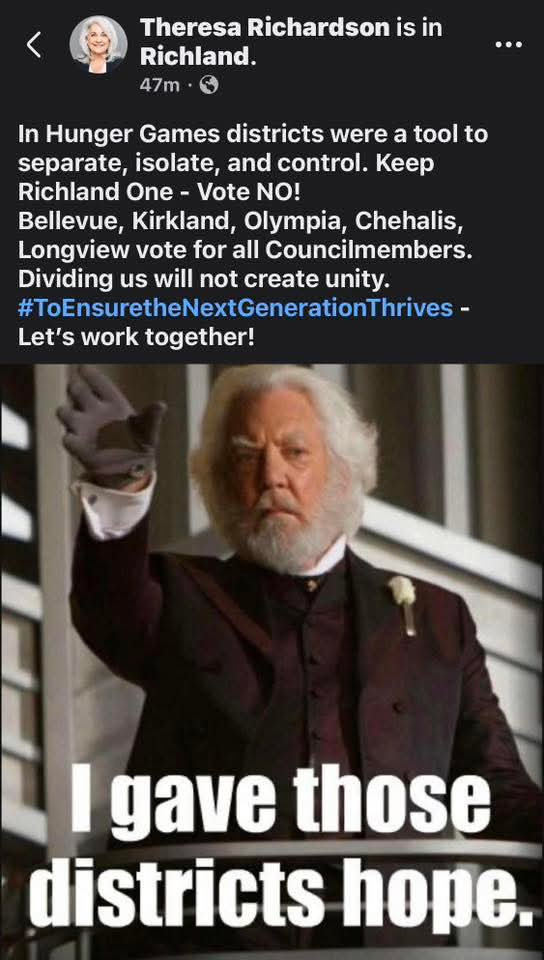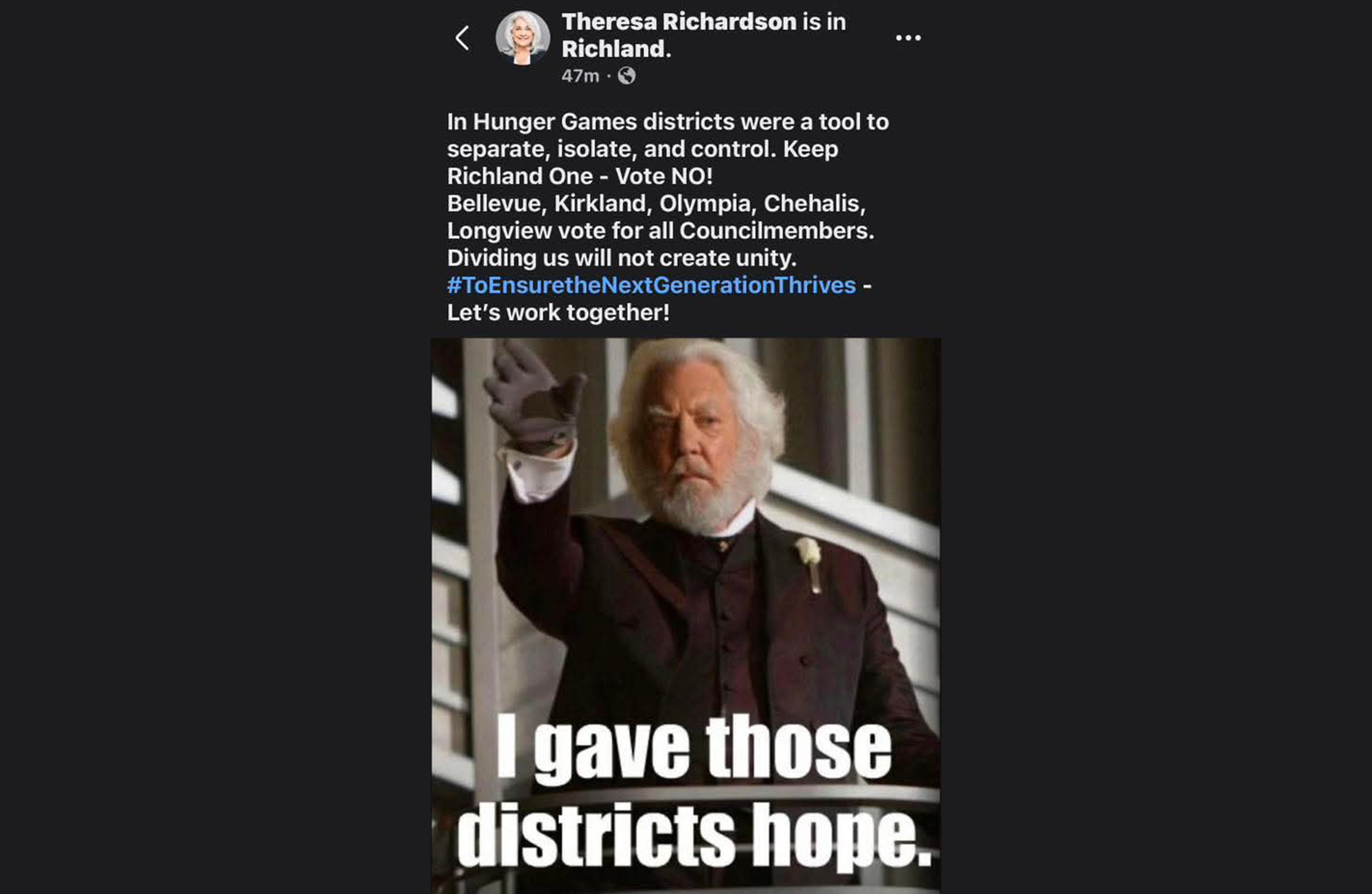Representative districts in Richland are finally in front of the voters.
It started with an idea.
Richland is the only city in the Tri-Cites that elects its city council with only at-large representatives. “The result is that most of our council members live in a small section of a city whose boundaries stretch from Badger Mountain to Benton City, Horn Rapids to Columbia Park.” — A Better Richland (ABR)
The City of Richland was chartered in 1958 as a first-class city* with seven council members serving at large (meaning they represent the entire city) — 22,970 people living in eight square miles. Now, the population is 64,372 people, but they are only represented by a handful of people living within 35 square miles. As the ABR website says:
This is leaving entire sections of Richland underrepresented, and the needs and concerns of the majority of Richland residents overlooked. It’s time to join together and create a council where members are elected by their neighbors in the neighborhoods where they live. Proximity to your constituents means greater accountability to us all.
Editor’s note: Read our previous articles, A Better Richland and ‘A Better Richland’ Success! on tumbleweird.org.
The charter amendment to change district representation first came up in 1971 and was defeated. Back then, the 40,000 residents voted against the move. But proponents for redistricting say that much has changed in 50 years.
Mary Cooke is a long-time resident who moved to Richland in the 1970s. She said she became interested in local politics a few years ago because she felt like she could make more impact on local issues. “I got this feeling that all politics — and this shouldn't be political — I know is local, so this is a place where we could make a difference.” Cooke is 82 years old, and she said when she heard about the possibility of changing to neighborhood districts, it just seemed like the right idea. Cooke went around gathering signatures to place the charter amendment on the ballot, and said it was met with bipartisan support. Cooke said, “They could have a Harris sign on their lawn and Trump on the next lawn, and they were all for this when we talked to them.”
Cooke said gathering signatures was “a very positive experience.” Most people didn’t seem to realize that they didn’t have representatives for their areas. It was a surprise to a lot of people. And Cooke said that seeing how hard it is to get the word out to voters, she could see how difficult it is to run for office in an at-large position. Walking door-to-door talking to voters is exhausting; running in district positions would be much easier for candidates.
Cooke also said that neighborhood representation means voters have someone that lives near them to hear their issues:
A lot of problems we have in the city are local. It could be a traffic circle out in the Badger Mountain area, or a roundabout on Stevens, but it's local to the people who live around there, and they need somebody that can listen to them and help them get the help they need. I think that's really important. We're just too big. We're growing so fast. And everybody knows that. Now's the time.
In general, people seem very interested in having representation that actually lives in the area they represent.
Of course, not everyone is on board for the change. A group calling themselves ‘Keep Richland One’ was started by the Columbia Basin PAC. The PAC is listed on the Public Disclosure Commission website and was registered in March of 2025 with the only named member being Patricia Holten, who serves as treasurer. Holten has the PAC filing under the guidelines of a ‘mini-filer’, meaning they don’t have to disclose donations or expenses unless they exceed $10,000.
And Holten is very busy this election season, as she is also running for city council in Richland.
Holten survived the primary back in August and will be on the ballot for the general election running against Robert Walko. The incumbent, Sandra Kent, received the least amount of votes in the primary and will not be on the ballot. Walko, however, is not able to serve, as he does not meet the condition set for in the city charter (not having been a resident of three years or longer before running to serve). Walko had attempted to remove himself from the ballot earlier in May, but missed the withdrawal deadline. If Walko receives the most votes in November, defeating Holten, the city council will get to appoint someone for that seat.
And there is a second city council race that has two candidates listed on the ballot for the general election, with only one person able to serve. Donald Landsman unfortunately passed away August 31. Landsman's name will still be on the ballot, running against John Maier. If Landsman receives the most votes, the council will also appoint someone for this position.
This means that Richland residents will potentially have no say over two seats on the Richland City Council.
When the Columbia Basin PAC and Holten were contacted for comment on this story, they asked for questions to be emailed to them, but failed to respond. The main thrust of the argument from ‘Keep Richland One’ is that the effort to create districts in Richland so that more neighborhoods have representation is a partisan one, and that what has worked for the last 70 years should be good enough for the future. ‘Keep Richland One’ also relies on unnamed ‘testimonials’ from people living in the entire Tri-Cities as their main source of argument for keeping the charter the same. There are no names on the website of people supporting the effort.
On October 14, the Mayor of Richland, Theresa Richardson, posted this meme, showing President Snow from the Hunger Games movies. It reads:
In Hunger Games districts were a tool to separate, isolate, and control. Keep Richland One – Vote NO! Bellevue, Kirkland, Olympia, Chehalis, Longview vote for all Councilmembers. Dividing us will not create unity. #ToEnsuretheNextGenerationThrives – Let’s work together!

The cities Richardson references in this meme are not first-class* cities, and have completely different classifications — different governing structures — than Richland. Richardson and Holten are claiming that ‘liberals’ are trying to change Richland, and they champion the notion that what has worked since the 1950s should work today.
Based on the signatures and support that A Better Richland has garnered, people from all walks of life want a government that represents them.
Richland voters will have a chance to decide on November 4.
*According to the Municipal Research and Services Center (MRSC), a first-class city is defined as a city with a population of 10,000 or more that has adopted a charter, allowing it to have broader powers and governance compared to other classifications.
There are ten first-class cities in Washington state. Six of them have Mayor-Council forms of government (Aberdeen, Bellingham, Bremerton, Everett, Seattle, and Spokane). All have voting wards or districts as well as voting for at-large positions. The other first-class cities, like Richland, have a Council-Manager form of government with a city manager as chief executive. That manager is hired by the city council and is their only employee. Vancouver is the only other first-class city in the state that has all at-large voting.
A lifelong resident of Eastern Washington, Dori enjoys the outdoors, her family, and making good trouble. She has worked for many years in broadcasting and reporting and believes in the value of the 4th estate. She is a true community advocate that loves Washington.


